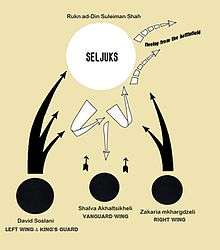Battle of Basian
| Battle of Basian | |||||||
|---|---|---|---|---|---|---|---|
| Part of the Georgian-Seljuk wars | |||||||
 Battle of Basiani | |||||||
| |||||||
| Belligerents | |||||||
|
|
Sultanate of Rum Anatolian beyliks Ayyubids Eldiguzids Burids Ghurids | ||||||
| Commanders and leaders | |||||||
|
David Soslan Zakaria Mkhargrdzeli Shalva of Akhaltsikhe | Süleymanshah II | ||||||
| Strength | |||||||
| 65,000 | 400,000 (various medieval sources)[1] | ||||||
The Battle of Basiani (Georgian: ბასიანის ბრძოლა) was fought, in the 13th century, between the armies of the Kingdom of Georgia and the Seljuqid Sultanate of Rum in the Basiani vale 60 km northeast of the city of Erzurum in what is now northeast Republic of Turkey. The battle is variously dated between 1202 and 1205, but 1203 or 1204 has lately been given preference. The contemporary Muslim annalist Ibn Bibi places the battle in 598 AH (October 1, 1201 - September 19, 1202). The modern Turkish historians identify the castle of Micingerd (Mazankert) as the location of the battle.
The battle was one of those several conflicts between the Georgian monarchs and the Seljuqid rulers of Anatolia that fill the region’s history of the 11th-13th century. It marked yet another attempt by the Seljuqids to stem the Georgian advances southward. The story of this conflict is narrated in the contemporary Georgian, Armenian and Islamic sources.
The sultan of Rüm, Rukn ad-Din Süleymanshah II (r. 1196-1204), fought hard, with considerable success, to reassemble once a vast state fragmentized under his late father Kilij Arslan II. Initially, his relations with the neighboring kingdom of Georgia were ostensibly peaceful, including the exchange of embassies and precious gifts. However, Süleymanshah’s 1201 takeover of Erzurum whose last Saltukid ruler (malik) `Ala' ad-Din was, at that time, a tributary to the Georgian crown, brought Süleymanshah II into an inevitable confrontation with the Georgians. The sultan further resented a tribute levied by the Georgian rulers upon the neighboring Muslim beyliks and requested its withdrawal in an ultimatum presented to the Georgian Queen regnant Tamar. According to the Georgian chronicle, Süleymanshah’s emissary delivered a highly offending letter to Tamar in which the sultan threatened to take her as a concubine upon his conquest of Georgia.
Süleymanshah, joined by his vassal beys, crossed into the Georgian marchlands and encamped in the Basiani vale. Tamar quickly marshaled an army throughout her possessions and put it under command of her consort, David Soslan. From their base in Javakheti, the Georgian troops under Soslan and amirspasalar Zacharia Mkhargrdzeli made a sudden advance into Basiani and assailed the enemy’s camp. In a pitched battle, the Seljuqid forces managed to roll back several attacks of the Georgians but were eventually overwhelmed and defeated. Loss of the sultan's banner to the Georgians resulted in a panic within the Seljuq ranks. Süleymanshah himself was wounded and withdrew to Erzurum.
The victory at Basiani allowed Georgia to secure its positions on the southwest and keep the Seljuqid resurgence in check, but Erzurum was, henceforth, to remain within the domains of the sultans of Rüm.
References
- ↑ Javakhishvili, p. 249
- (Georgian) D. Ivane Javakhishvili, (1983), ქართველი ერის ისტორია (History of Georgian Nation), Tbilisi: Georgia, USSR.
- (Georgian) Melikishvili, Giorgi et al. (1970), საქართველოს ისტორიის ნარკვევები (Studies in the History of Georgia), Vol. 2. Tbilisi: Sabch’ota Sakartvelo.
- (Turkish) Osman Turan, Selçuklular Zamaninda Türkiye, Istanbul, 1971
- (Russian) V. Dondua et al. (transl., 1985), Жизнь царицы цариц Тамар (The Life of the Queen of Queens Tamar), Commentaries by N. Berdzenishvili. Tbilisi: Metsniereba